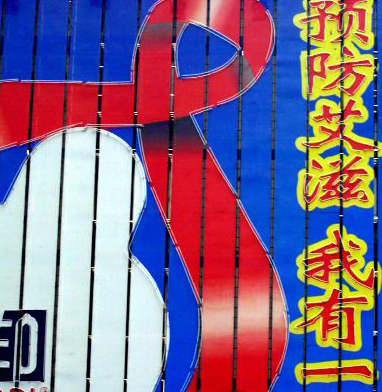|

|
|
An outdoor advertisement about anti-AIDS campaign is seen in Shanghai.
|
Ms Guan and her colleagues began to visit public venues like hotels, night clubs and residential communities to install condom vending machines. However, they were not always made welcome. Many places considered the presence of the machines to be embarrassing, and something that could damage their image. Often they would refuse to cooperate at all. As a result, during the whole of 2004, Ms Guan was able to install 1,000 condom vending machines across Beijing, achieving just one third of her goal.
At the same time, Ms Guan was also busy setting up methadone clinics. Unfortunately, Beijing's subordinate administrative regions were opposed to such establishments on the ground that the clinics could draw attention to their failure to control drug-taking. At the end of 2004, she finally managed to set up a clinic. In order to make the clinic and her campaign better known, she planned a large publicity stunt. Sadly the local authorities gave the plan an uncompromising refusal.
It was Ms Guan's safe needle supply campaign that was hardest hit. At that time, drug takers were still viewed as criminals by the police. The public security authorities would not budge on their opposition to the setup of any clinic for providing drug takers with free injections and needles. They would arrest anyone who came to such clinics for their injections. Thus Ms Guan failed to get any clinics set up in 2004.
Looking back at that year, Ms Guan says with a heavy heart: "It was the most difficult year of my career." But Ms Guan refused to give up and before her retirement she had succeeded in establishing 8 methadone clinics and 11 locations for safe injections. Fortunately, central government supported her campaign. In March 2006, the State Council issued a regulation, stipulating that all officially-designated venues should install condom vending machines. In May 2008, Beijing municipal government required that all public venues should have such machines, including toilets, karaoke halls and large construction sites.
In June 2007, Ms Guan stepped down but she did not indulge herself in retirement like many others. Instead, she took up a more challenging position and became the chief of the Beijing office of the China Global Fund AIDS Program Round Six. She established a good rapport with many grassroots organizations and built up a more comprehensive picture of the pattern of infection among risk groups at the grassroots.
Even now she still feels pity for a young man she came to know after taking her present job. The 19-year old had lost his mother and when he came to Beijing he could find no other way of making a living than by providing gay sex services. Ms Guan was sympathetic to him and kept in touch with him for quite a while. Every time she spoke to him she would remind him of the importance of using condoms. Sadly, he nevertheless contracted AIDS and lost the will to live. Shortly afterwards, he stopped answering her calls.
Thanks to Ms Guan's efforts, Beijing municipal government now provides annual funds of 300,000 yuan (about US$44,000) for grassroots organizations. Some of them say they would never have survived without Ms Guan. To these organizations Ms Guan is a different type of official – instead of telling them what to do, she asks what help they need.
(Source: China Newsweek, translated by Pang Li for China.org.cn, December 24, 2008)